Reconceptualising Early Childhood Education: A Critical Analysis
VerifiedAdded on 2023/06/07
|8
|2241
|155
AI Summary
This essay provides a critical analysis of early childhood education through four different perspectives. The essay reflects on personal experiences and uses theories to explain them. The essay highlights the importance of allowing children to develop their own skills and interests.
Contribute Materials
Your contribution can guide someone’s learning journey. Share your
documents today.
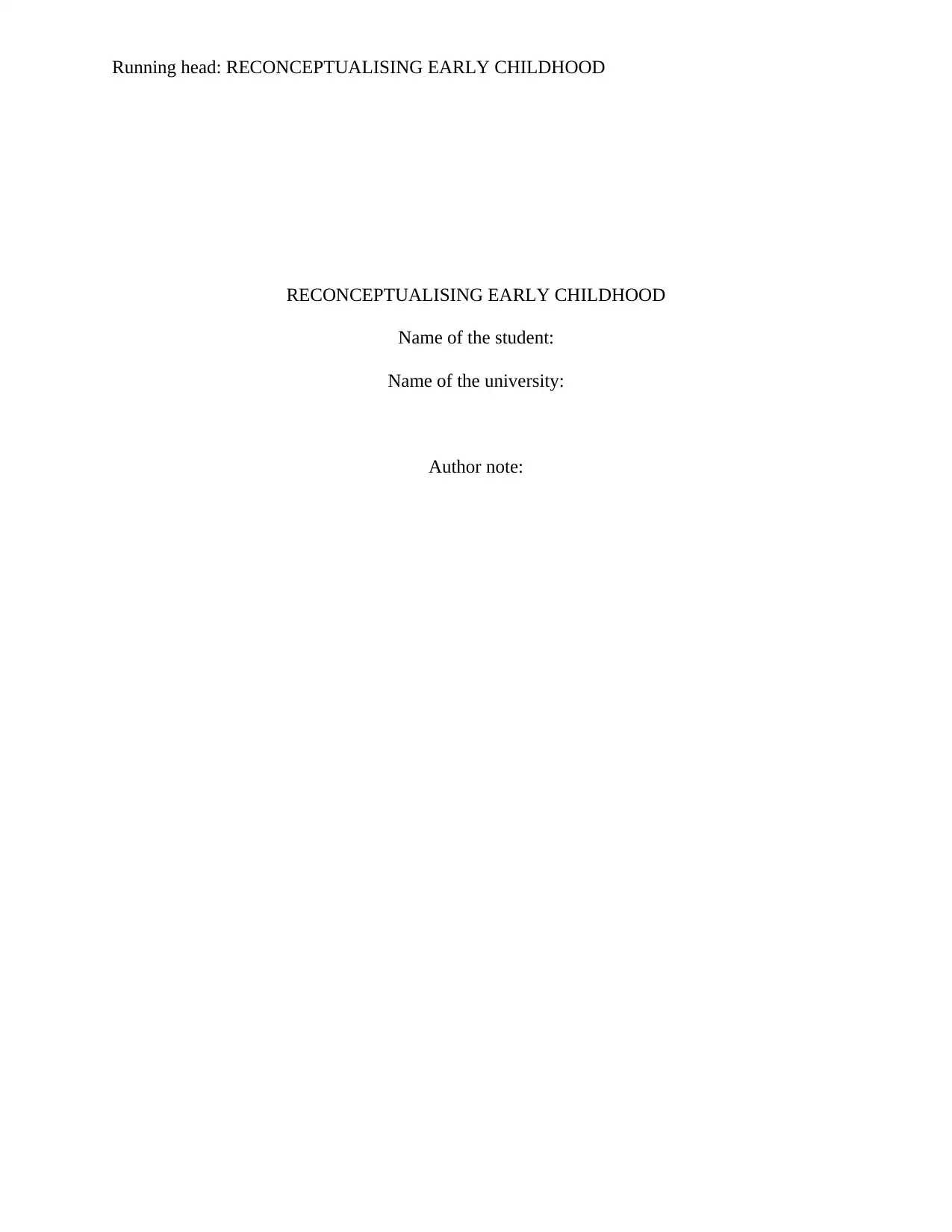
Running head: RECONCEPTUALISING EARLY CHILDHOOD
RECONCEPTUALISING EARLY CHILDHOOD
Name of the student:
Name of the university:
Author note:
RECONCEPTUALISING EARLY CHILDHOOD
Name of the student:
Name of the university:
Author note:
Secure Best Marks with AI Grader
Need help grading? Try our AI Grader for instant feedback on your assignments.
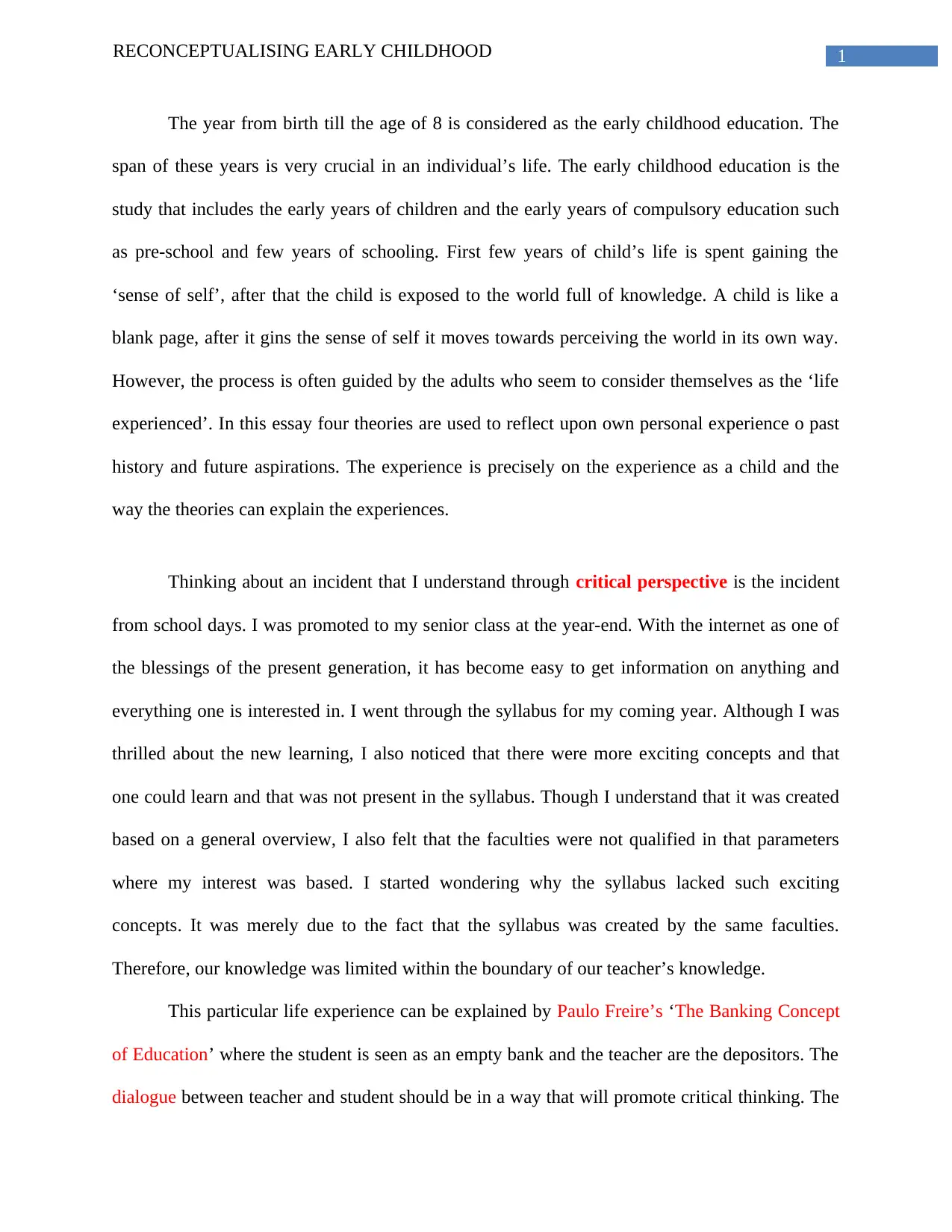
1RECONCEPTUALISING EARLY CHILDHOOD
The year from birth till the age of 8 is considered as the early childhood education. The
span of these years is very crucial in an individual’s life. The early childhood education is the
study that includes the early years of children and the early years of compulsory education such
as pre-school and few years of schooling. First few years of child’s life is spent gaining the
‘sense of self’, after that the child is exposed to the world full of knowledge. A child is like a
blank page, after it gins the sense of self it moves towards perceiving the world in its own way.
However, the process is often guided by the adults who seem to consider themselves as the ‘life
experienced’. In this essay four theories are used to reflect upon own personal experience o past
history and future aspirations. The experience is precisely on the experience as a child and the
way the theories can explain the experiences.
Thinking about an incident that I understand through critical perspective is the incident
from school days. I was promoted to my senior class at the year-end. With the internet as one of
the blessings of the present generation, it has become easy to get information on anything and
everything one is interested in. I went through the syllabus for my coming year. Although I was
thrilled about the new learning, I also noticed that there were more exciting concepts and that
one could learn and that was not present in the syllabus. Though I understand that it was created
based on a general overview, I also felt that the faculties were not qualified in that parameters
where my interest was based. I started wondering why the syllabus lacked such exciting
concepts. It was merely due to the fact that the syllabus was created by the same faculties.
Therefore, our knowledge was limited within the boundary of our teacher’s knowledge.
This particular life experience can be explained by Paulo Freire’s ‘The Banking Concept
of Education’ where the student is seen as an empty bank and the teacher are the depositors. The
dialogue between teacher and student should be in a way that will promote critical thinking. The
The year from birth till the age of 8 is considered as the early childhood education. The
span of these years is very crucial in an individual’s life. The early childhood education is the
study that includes the early years of children and the early years of compulsory education such
as pre-school and few years of schooling. First few years of child’s life is spent gaining the
‘sense of self’, after that the child is exposed to the world full of knowledge. A child is like a
blank page, after it gins the sense of self it moves towards perceiving the world in its own way.
However, the process is often guided by the adults who seem to consider themselves as the ‘life
experienced’. In this essay four theories are used to reflect upon own personal experience o past
history and future aspirations. The experience is precisely on the experience as a child and the
way the theories can explain the experiences.
Thinking about an incident that I understand through critical perspective is the incident
from school days. I was promoted to my senior class at the year-end. With the internet as one of
the blessings of the present generation, it has become easy to get information on anything and
everything one is interested in. I went through the syllabus for my coming year. Although I was
thrilled about the new learning, I also noticed that there were more exciting concepts and that
one could learn and that was not present in the syllabus. Though I understand that it was created
based on a general overview, I also felt that the faculties were not qualified in that parameters
where my interest was based. I started wondering why the syllabus lacked such exciting
concepts. It was merely due to the fact that the syllabus was created by the same faculties.
Therefore, our knowledge was limited within the boundary of our teacher’s knowledge.
This particular life experience can be explained by Paulo Freire’s ‘The Banking Concept
of Education’ where the student is seen as an empty bank and the teacher are the depositors. The
dialogue between teacher and student should be in a way that will promote critical thinking. The
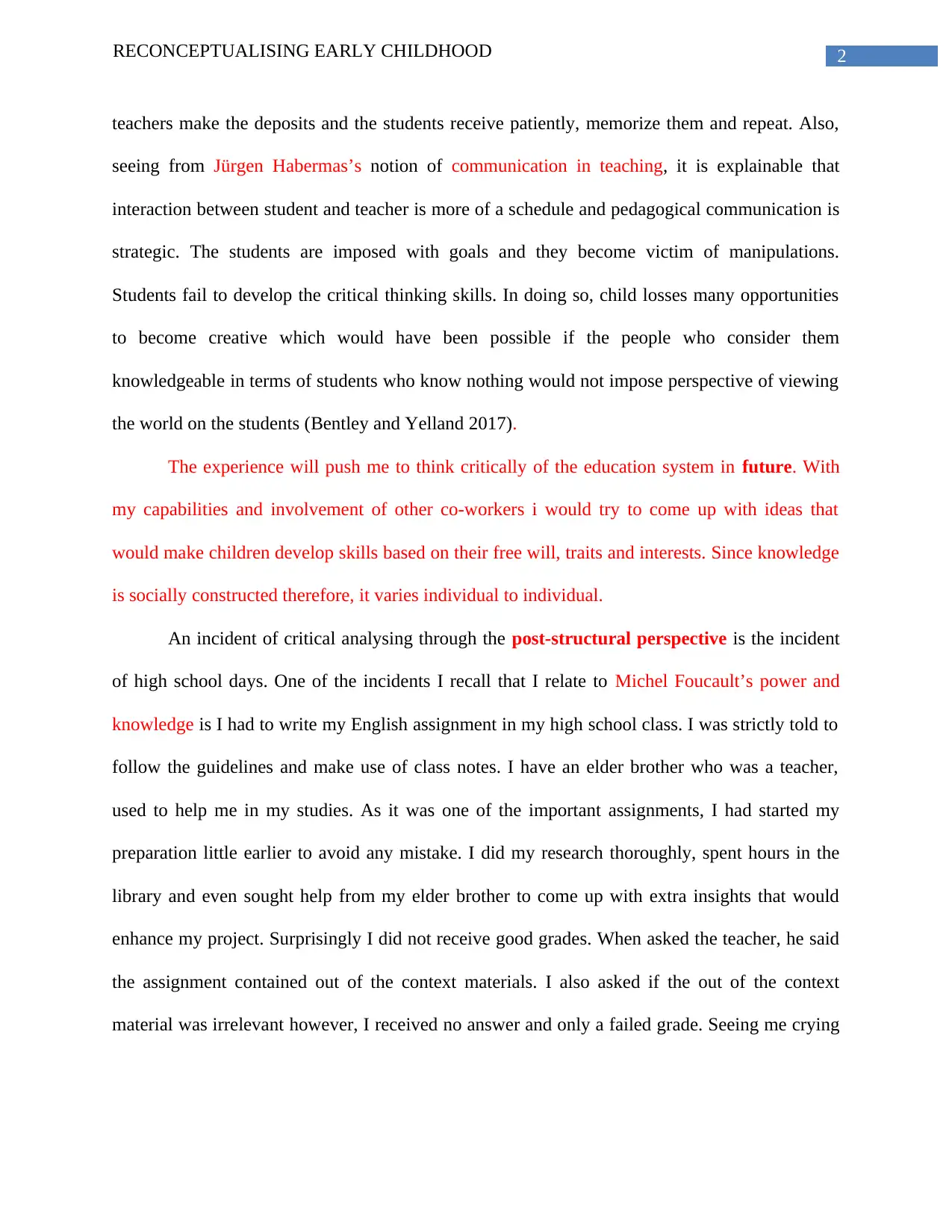
2RECONCEPTUALISING EARLY CHILDHOOD
teachers make the deposits and the students receive patiently, memorize them and repeat. Also,
seeing from Jürgen Habermas’s notion of communication in teaching, it is explainable that
interaction between student and teacher is more of a schedule and pedagogical communication is
strategic. The students are imposed with goals and they become victim of manipulations.
Students fail to develop the critical thinking skills. In doing so, child losses many opportunities
to become creative which would have been possible if the people who consider them
knowledgeable in terms of students who know nothing would not impose perspective of viewing
the world on the students (Bentley and Yelland 2017).
The experience will push me to think critically of the education system in future. With
my capabilities and involvement of other co-workers i would try to come up with ideas that
would make children develop skills based on their free will, traits and interests. Since knowledge
is socially constructed therefore, it varies individual to individual.
An incident of critical analysing through the post-structural perspective is the incident
of high school days. One of the incidents I recall that I relate to Michel Foucault’s power and
knowledge is I had to write my English assignment in my high school class. I was strictly told to
follow the guidelines and make use of class notes. I have an elder brother who was a teacher,
used to help me in my studies. As it was one of the important assignments, I had started my
preparation little earlier to avoid any mistake. I did my research thoroughly, spent hours in the
library and even sought help from my elder brother to come up with extra insights that would
enhance my project. Surprisingly I did not receive good grades. When asked the teacher, he said
the assignment contained out of the context materials. I also asked if the out of the context
material was irrelevant however, I received no answer and only a failed grade. Seeing me crying
teachers make the deposits and the students receive patiently, memorize them and repeat. Also,
seeing from Jürgen Habermas’s notion of communication in teaching, it is explainable that
interaction between student and teacher is more of a schedule and pedagogical communication is
strategic. The students are imposed with goals and they become victim of manipulations.
Students fail to develop the critical thinking skills. In doing so, child losses many opportunities
to become creative which would have been possible if the people who consider them
knowledgeable in terms of students who know nothing would not impose perspective of viewing
the world on the students (Bentley and Yelland 2017).
The experience will push me to think critically of the education system in future. With
my capabilities and involvement of other co-workers i would try to come up with ideas that
would make children develop skills based on their free will, traits and interests. Since knowledge
is socially constructed therefore, it varies individual to individual.
An incident of critical analysing through the post-structural perspective is the incident
of high school days. One of the incidents I recall that I relate to Michel Foucault’s power and
knowledge is I had to write my English assignment in my high school class. I was strictly told to
follow the guidelines and make use of class notes. I have an elder brother who was a teacher,
used to help me in my studies. As it was one of the important assignments, I had started my
preparation little earlier to avoid any mistake. I did my research thoroughly, spent hours in the
library and even sought help from my elder brother to come up with extra insights that would
enhance my project. Surprisingly I did not receive good grades. When asked the teacher, he said
the assignment contained out of the context materials. I also asked if the out of the context
material was irrelevant however, I received no answer and only a failed grade. Seeing me crying
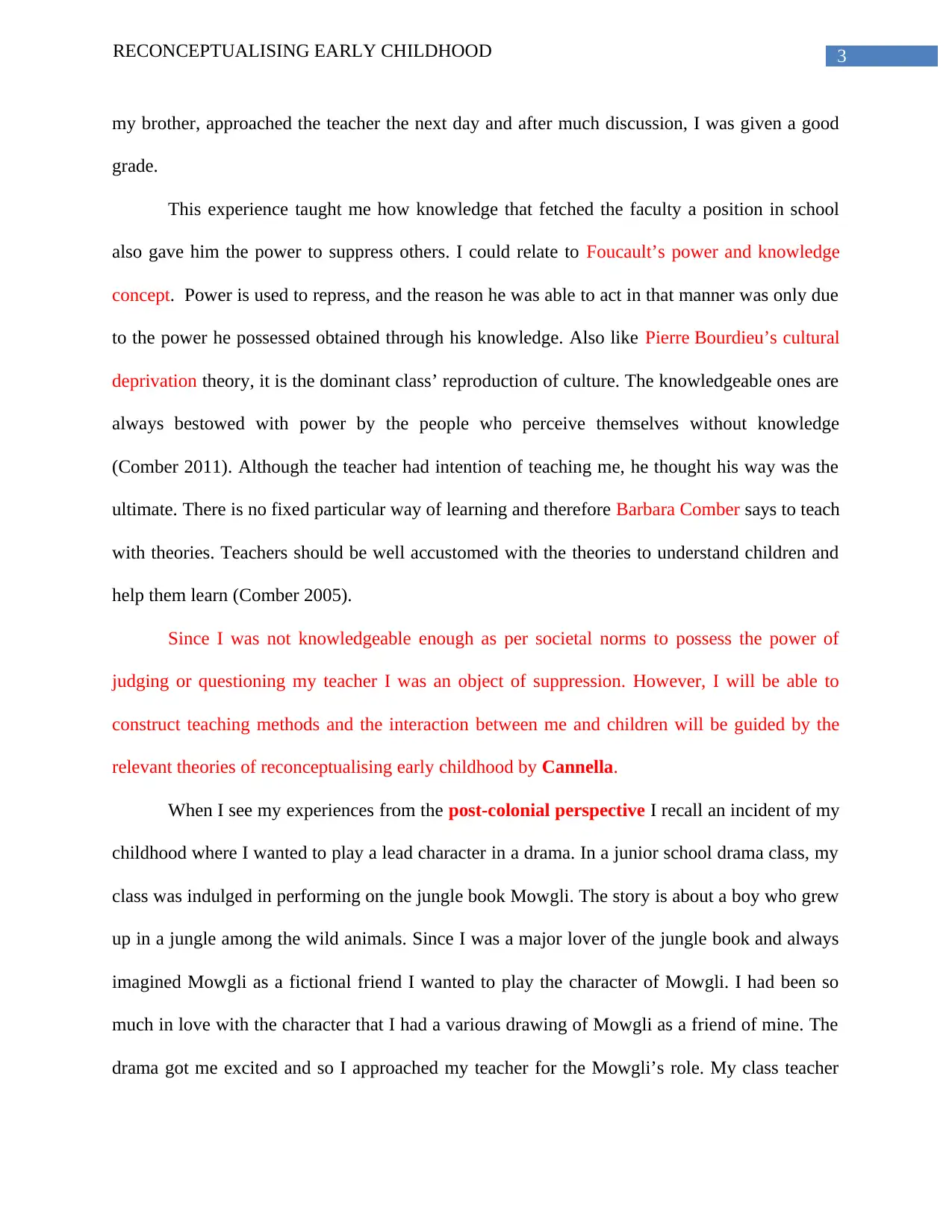
3RECONCEPTUALISING EARLY CHILDHOOD
my brother, approached the teacher the next day and after much discussion, I was given a good
grade.
This experience taught me how knowledge that fetched the faculty a position in school
also gave him the power to suppress others. I could relate to Foucault’s power and knowledge
concept. Power is used to repress, and the reason he was able to act in that manner was only due
to the power he possessed obtained through his knowledge. Also like Pierre Bourdieu’s cultural
deprivation theory, it is the dominant class’ reproduction of culture. The knowledgeable ones are
always bestowed with power by the people who perceive themselves without knowledge
(Comber 2011). Although the teacher had intention of teaching me, he thought his way was the
ultimate. There is no fixed particular way of learning and therefore Barbara Comber says to teach
with theories. Teachers should be well accustomed with the theories to understand children and
help them learn (Comber 2005).
Since I was not knowledgeable enough as per societal norms to possess the power of
judging or questioning my teacher I was an object of suppression. However, I will be able to
construct teaching methods and the interaction between me and children will be guided by the
relevant theories of reconceptualising early childhood by Cannella.
When I see my experiences from the post-colonial perspective I recall an incident of my
childhood where I wanted to play a lead character in a drama. In a junior school drama class, my
class was indulged in performing on the jungle book Mowgli. The story is about a boy who grew
up in a jungle among the wild animals. Since I was a major lover of the jungle book and always
imagined Mowgli as a fictional friend I wanted to play the character of Mowgli. I had been so
much in love with the character that I had a various drawing of Mowgli as a friend of mine. The
drama got me excited and so I approached my teacher for the Mowgli’s role. My class teacher
my brother, approached the teacher the next day and after much discussion, I was given a good
grade.
This experience taught me how knowledge that fetched the faculty a position in school
also gave him the power to suppress others. I could relate to Foucault’s power and knowledge
concept. Power is used to repress, and the reason he was able to act in that manner was only due
to the power he possessed obtained through his knowledge. Also like Pierre Bourdieu’s cultural
deprivation theory, it is the dominant class’ reproduction of culture. The knowledgeable ones are
always bestowed with power by the people who perceive themselves without knowledge
(Comber 2011). Although the teacher had intention of teaching me, he thought his way was the
ultimate. There is no fixed particular way of learning and therefore Barbara Comber says to teach
with theories. Teachers should be well accustomed with the theories to understand children and
help them learn (Comber 2005).
Since I was not knowledgeable enough as per societal norms to possess the power of
judging or questioning my teacher I was an object of suppression. However, I will be able to
construct teaching methods and the interaction between me and children will be guided by the
relevant theories of reconceptualising early childhood by Cannella.
When I see my experiences from the post-colonial perspective I recall an incident of my
childhood where I wanted to play a lead character in a drama. In a junior school drama class, my
class was indulged in performing on the jungle book Mowgli. The story is about a boy who grew
up in a jungle among the wild animals. Since I was a major lover of the jungle book and always
imagined Mowgli as a fictional friend I wanted to play the character of Mowgli. I had been so
much in love with the character that I had a various drawing of Mowgli as a friend of mine. The
drama got me excited and so I approached my teacher for the Mowgli’s role. My class teacher
Secure Best Marks with AI Grader
Need help grading? Try our AI Grader for instant feedback on your assignments.
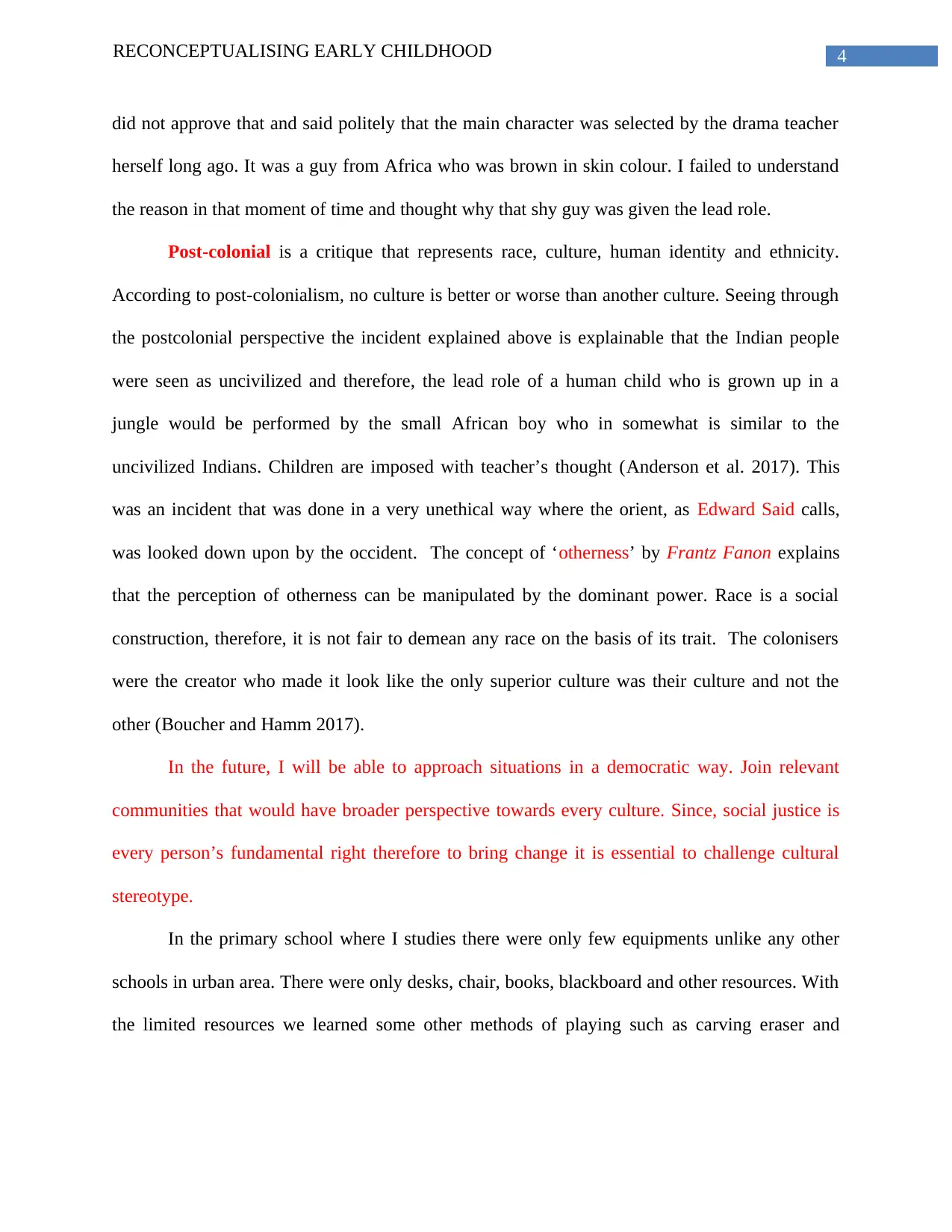
4RECONCEPTUALISING EARLY CHILDHOOD
did not approve that and said politely that the main character was selected by the drama teacher
herself long ago. It was a guy from Africa who was brown in skin colour. I failed to understand
the reason in that moment of time and thought why that shy guy was given the lead role.
Post-colonial is a critique that represents race, culture, human identity and ethnicity.
According to post-colonialism, no culture is better or worse than another culture. Seeing through
the postcolonial perspective the incident explained above is explainable that the Indian people
were seen as uncivilized and therefore, the lead role of a human child who is grown up in a
jungle would be performed by the small African boy who in somewhat is similar to the
uncivilized Indians. Children are imposed with teacher’s thought (Anderson et al. 2017). This
was an incident that was done in a very unethical way where the orient, as Edward Said calls,
was looked down upon by the occident. The concept of ‘otherness’ by Frantz Fanon explains
that the perception of otherness can be manipulated by the dominant power. Race is a social
construction, therefore, it is not fair to demean any race on the basis of its trait. The colonisers
were the creator who made it look like the only superior culture was their culture and not the
other (Boucher and Hamm 2017).
In the future, I will be able to approach situations in a democratic way. Join relevant
communities that would have broader perspective towards every culture. Since, social justice is
every person’s fundamental right therefore to bring change it is essential to challenge cultural
stereotype.
In the primary school where I studies there were only few equipments unlike any other
schools in urban area. There were only desks, chair, books, blackboard and other resources. With
the limited resources we learned some other methods of playing such as carving eraser and
did not approve that and said politely that the main character was selected by the drama teacher
herself long ago. It was a guy from Africa who was brown in skin colour. I failed to understand
the reason in that moment of time and thought why that shy guy was given the lead role.
Post-colonial is a critique that represents race, culture, human identity and ethnicity.
According to post-colonialism, no culture is better or worse than another culture. Seeing through
the postcolonial perspective the incident explained above is explainable that the Indian people
were seen as uncivilized and therefore, the lead role of a human child who is grown up in a
jungle would be performed by the small African boy who in somewhat is similar to the
uncivilized Indians. Children are imposed with teacher’s thought (Anderson et al. 2017). This
was an incident that was done in a very unethical way where the orient, as Edward Said calls,
was looked down upon by the occident. The concept of ‘otherness’ by Frantz Fanon explains
that the perception of otherness can be manipulated by the dominant power. Race is a social
construction, therefore, it is not fair to demean any race on the basis of its trait. The colonisers
were the creator who made it look like the only superior culture was their culture and not the
other (Boucher and Hamm 2017).
In the future, I will be able to approach situations in a democratic way. Join relevant
communities that would have broader perspective towards every culture. Since, social justice is
every person’s fundamental right therefore to bring change it is essential to challenge cultural
stereotype.
In the primary school where I studies there were only few equipments unlike any other
schools in urban area. There were only desks, chair, books, blackboard and other resources. With
the limited resources we learned some other methods of playing such as carving eraser and
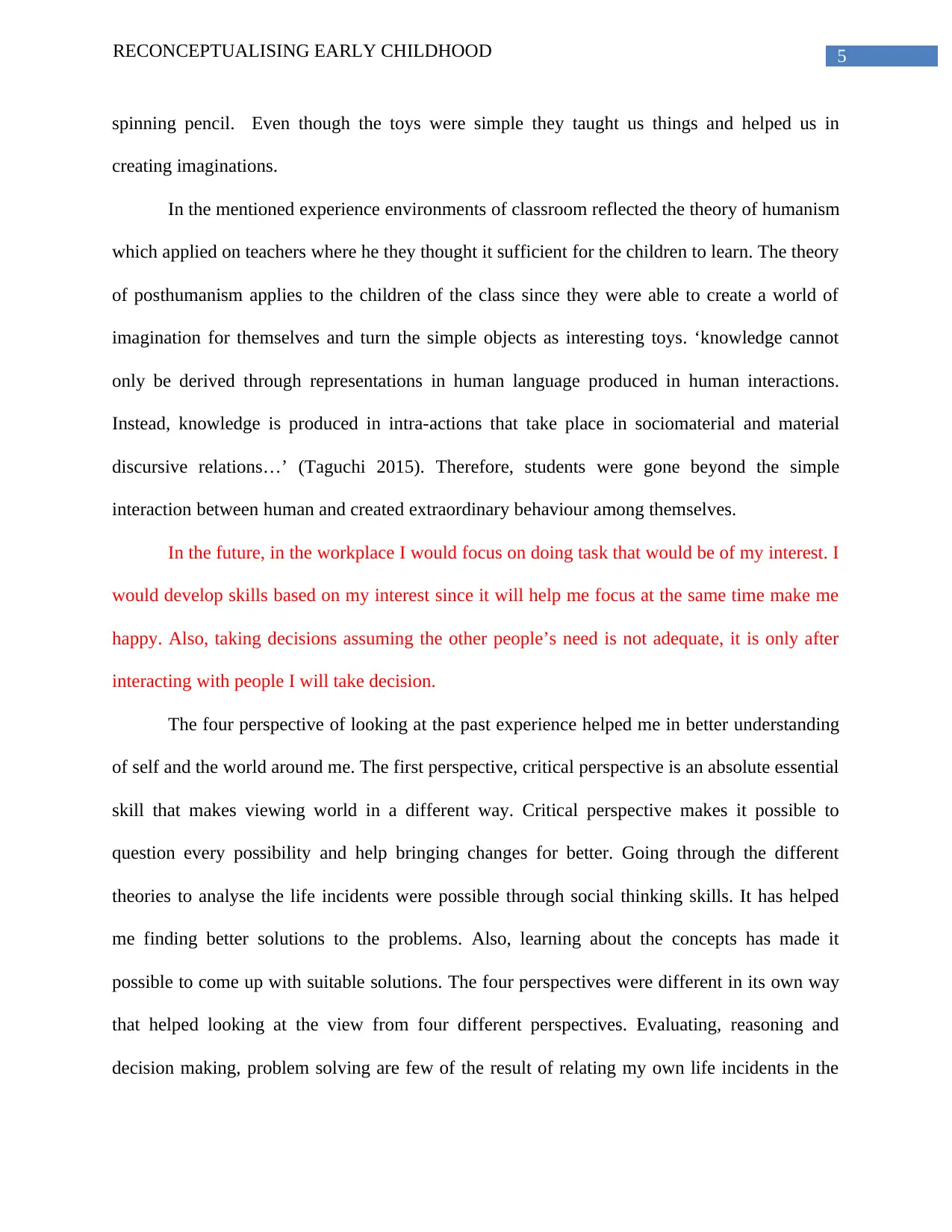
5RECONCEPTUALISING EARLY CHILDHOOD
spinning pencil. Even though the toys were simple they taught us things and helped us in
creating imaginations.
In the mentioned experience environments of classroom reflected the theory of humanism
which applied on teachers where he they thought it sufficient for the children to learn. The theory
of posthumanism applies to the children of the class since they were able to create a world of
imagination for themselves and turn the simple objects as interesting toys. ‘knowledge cannot
only be derived through representations in human language produced in human interactions.
Instead, knowledge is produced in intra-actions that take place in sociomaterial and material
discursive relations…’ (Taguchi 2015). Therefore, students were gone beyond the simple
interaction between human and created extraordinary behaviour among themselves.
In the future, in the workplace I would focus on doing task that would be of my interest. I
would develop skills based on my interest since it will help me focus at the same time make me
happy. Also, taking decisions assuming the other people’s need is not adequate, it is only after
interacting with people I will take decision.
The four perspective of looking at the past experience helped me in better understanding
of self and the world around me. The first perspective, critical perspective is an absolute essential
skill that makes viewing world in a different way. Critical perspective makes it possible to
question every possibility and help bringing changes for better. Going through the different
theories to analyse the life incidents were possible through social thinking skills. It has helped
me finding better solutions to the problems. Also, learning about the concepts has made it
possible to come up with suitable solutions. The four perspectives were different in its own way
that helped looking at the view from four different perspectives. Evaluating, reasoning and
decision making, problem solving are few of the result of relating my own life incidents in the
spinning pencil. Even though the toys were simple they taught us things and helped us in
creating imaginations.
In the mentioned experience environments of classroom reflected the theory of humanism
which applied on teachers where he they thought it sufficient for the children to learn. The theory
of posthumanism applies to the children of the class since they were able to create a world of
imagination for themselves and turn the simple objects as interesting toys. ‘knowledge cannot
only be derived through representations in human language produced in human interactions.
Instead, knowledge is produced in intra-actions that take place in sociomaterial and material
discursive relations…’ (Taguchi 2015). Therefore, students were gone beyond the simple
interaction between human and created extraordinary behaviour among themselves.
In the future, in the workplace I would focus on doing task that would be of my interest. I
would develop skills based on my interest since it will help me focus at the same time make me
happy. Also, taking decisions assuming the other people’s need is not adequate, it is only after
interacting with people I will take decision.
The four perspective of looking at the past experience helped me in better understanding
of self and the world around me. The first perspective, critical perspective is an absolute essential
skill that makes viewing world in a different way. Critical perspective makes it possible to
question every possibility and help bringing changes for better. Going through the different
theories to analyse the life incidents were possible through social thinking skills. It has helped
me finding better solutions to the problems. Also, learning about the concepts has made it
possible to come up with suitable solutions. The four perspectives were different in its own way
that helped looking at the view from four different perspectives. Evaluating, reasoning and
decision making, problem solving are few of the result of relating my own life incidents in the
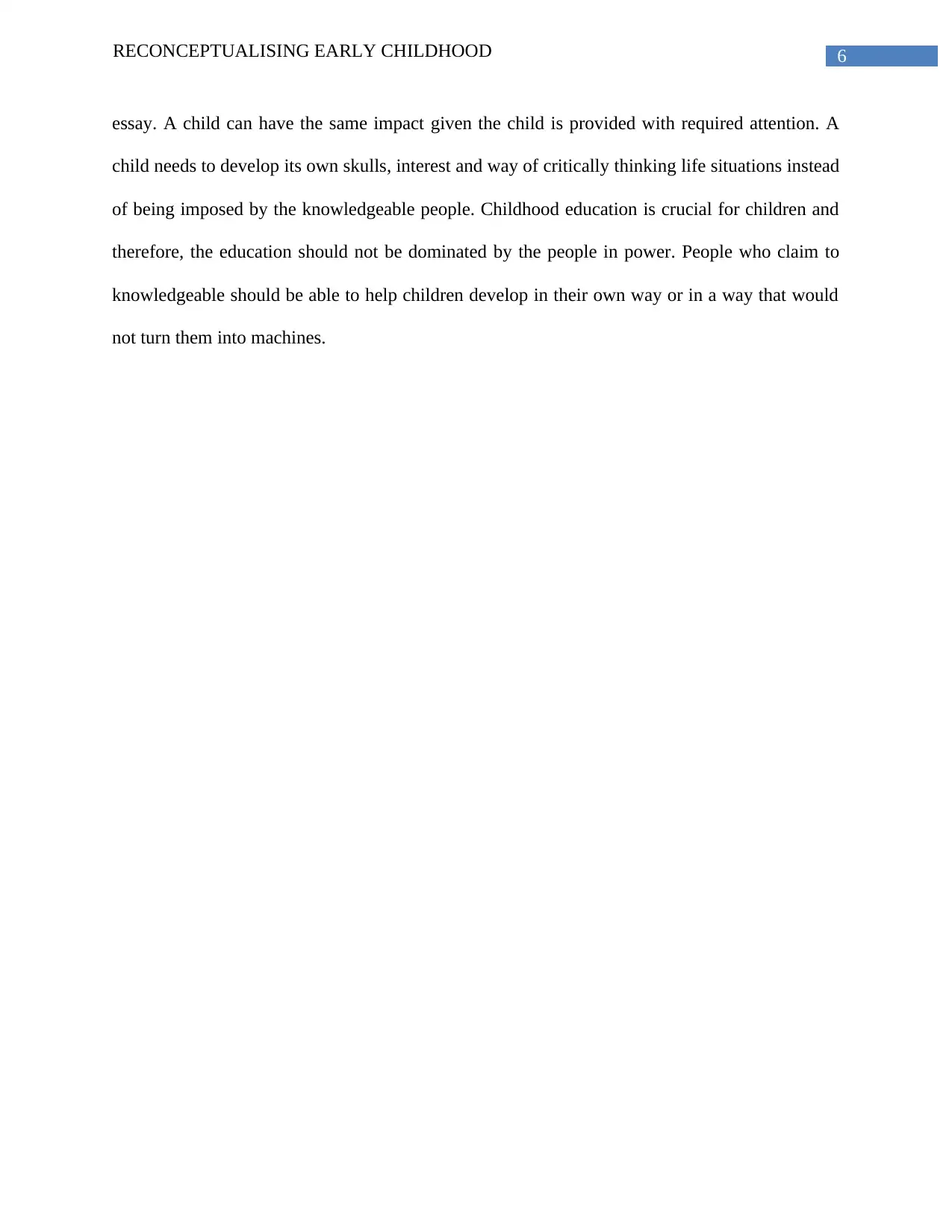
6RECONCEPTUALISING EARLY CHILDHOOD
essay. A child can have the same impact given the child is provided with required attention. A
child needs to develop its own skulls, interest and way of critically thinking life situations instead
of being imposed by the knowledgeable people. Childhood education is crucial for children and
therefore, the education should not be dominated by the people in power. People who claim to
knowledgeable should be able to help children develop in their own way or in a way that would
not turn them into machines.
essay. A child can have the same impact given the child is provided with required attention. A
child needs to develop its own skulls, interest and way of critically thinking life situations instead
of being imposed by the knowledgeable people. Childhood education is crucial for children and
therefore, the education should not be dominated by the people in power. People who claim to
knowledgeable should be able to help children develop in their own way or in a way that would
not turn them into machines.
Paraphrase This Document
Need a fresh take? Get an instant paraphrase of this document with our AI Paraphraser
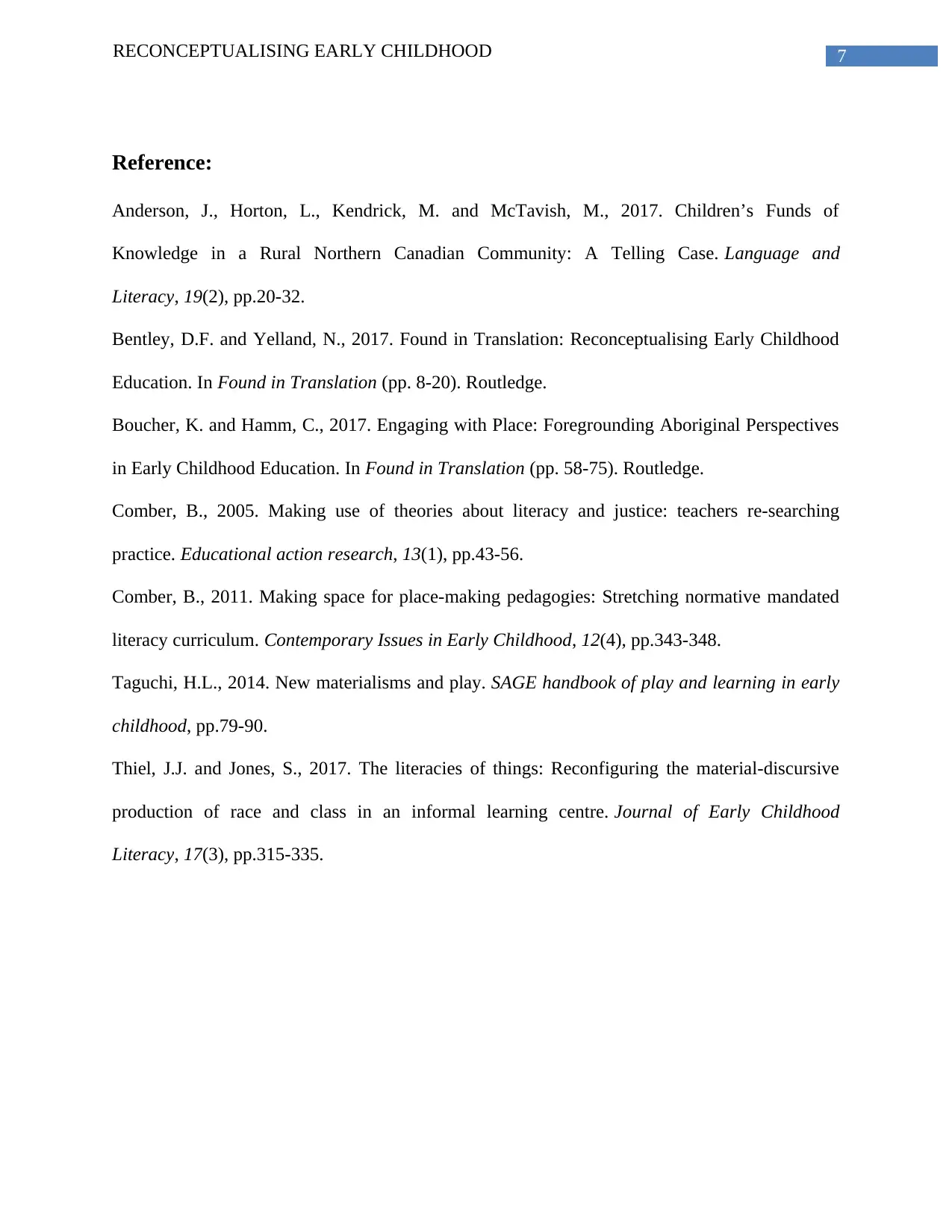
7RECONCEPTUALISING EARLY CHILDHOOD
Reference:
Anderson, J., Horton, L., Kendrick, M. and McTavish, M., 2017. Children’s Funds of
Knowledge in a Rural Northern Canadian Community: A Telling Case. Language and
Literacy, 19(2), pp.20-32.
Bentley, D.F. and Yelland, N., 2017. Found in Translation: Reconceptualising Early Childhood
Education. In Found in Translation (pp. 8-20). Routledge.
Boucher, K. and Hamm, C., 2017. Engaging with Place: Foregrounding Aboriginal Perspectives
in Early Childhood Education. In Found in Translation (pp. 58-75). Routledge.
Comber, B., 2005. Making use of theories about literacy and justice: teachers re-searching
practice. Educational action research, 13(1), pp.43-56.
Comber, B., 2011. Making space for place-making pedagogies: Stretching normative mandated
literacy curriculum. Contemporary Issues in Early Childhood, 12(4), pp.343-348.
Taguchi, H.L., 2014. New materialisms and play. SAGE handbook of play and learning in early
childhood, pp.79-90.
Thiel, J.J. and Jones, S., 2017. The literacies of things: Reconfiguring the material-discursive
production of race and class in an informal learning centre. Journal of Early Childhood
Literacy, 17(3), pp.315-335.
Reference:
Anderson, J., Horton, L., Kendrick, M. and McTavish, M., 2017. Children’s Funds of
Knowledge in a Rural Northern Canadian Community: A Telling Case. Language and
Literacy, 19(2), pp.20-32.
Bentley, D.F. and Yelland, N., 2017. Found in Translation: Reconceptualising Early Childhood
Education. In Found in Translation (pp. 8-20). Routledge.
Boucher, K. and Hamm, C., 2017. Engaging with Place: Foregrounding Aboriginal Perspectives
in Early Childhood Education. In Found in Translation (pp. 58-75). Routledge.
Comber, B., 2005. Making use of theories about literacy and justice: teachers re-searching
practice. Educational action research, 13(1), pp.43-56.
Comber, B., 2011. Making space for place-making pedagogies: Stretching normative mandated
literacy curriculum. Contemporary Issues in Early Childhood, 12(4), pp.343-348.
Taguchi, H.L., 2014. New materialisms and play. SAGE handbook of play and learning in early
childhood, pp.79-90.
Thiel, J.J. and Jones, S., 2017. The literacies of things: Reconfiguring the material-discursive
production of race and class in an informal learning centre. Journal of Early Childhood
Literacy, 17(3), pp.315-335.
1 out of 8
Related Documents
Your All-in-One AI-Powered Toolkit for Academic Success.
+13062052269
info@desklib.com
Available 24*7 on WhatsApp / Email
![[object Object]](/_next/static/media/star-bottom.7253800d.svg)
Unlock your academic potential
© 2024 | Zucol Services PVT LTD | All rights reserved.





